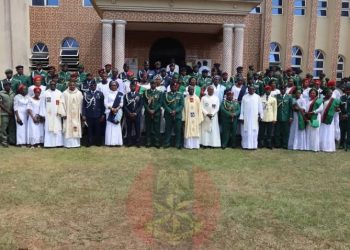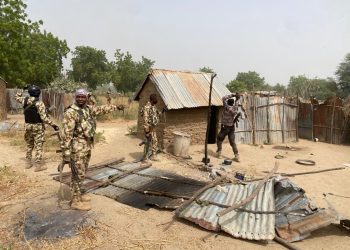…trains first responders to tackle IED threats
By Nkechi Eze
In a decisive move to curb the menace of Improvised Explosive Devices (IEDs) and strengthen national resilience against terrorism, the Federal Government has commenced a specialised counter-IED training programme for first responders, with a firm emphasis on controlling the movement of explosive precursor materials and sharpening inter-agency crisis response mechanisms.
Speaking to journalists at the opening of the programme on Monday in Abuja, the National Coordinator of the National Counter Terrorism Centre (NCTC), Major General Adamu Garba Laka, described the initiative as a critical component of Nigeria’s counter-terrorism strategy. He explained that the training, which forms part of preparations for Exercise Rapid Response 2, is designed to equip personnel on the frontlines with the technical expertise to detect, neutralise, and effectively respond to IED threats.
“The greatest threat in the North-East remains the use of IEDs by terrorist groups. Most of our troops have been maimed or killed due to the deployment of these devices. This programme is aimed at giving first responders the knowledge and techniques to respond to various IED threats across the country,” Major Laka said.
He highlighted the Centre’s ongoing efforts to regulate the movement of chemicals commonly exploited by terrorists to fabricate explosives. Ammonium-based substances, particularly Urea Ammonium (UA), he noted, have been identified as a major risk. “You see, the problem with IEDs is that the materials used in their production can be sourced in the open market. Ammonium in particular poses a big risk, which is why we strictly monitor and control its movement. We ensure it does not end up in the North-East where it can be diverted for illicit use,” he explained.
According to him, as government tightened control of ammonium and other bomb-making precursors, insurgents began resorting to alternative methods, including adapting unexploded ordnance and detonating them with pressure plates, batteries, and mobile phones. This, he said, underscores the need for constant innovation, intelligence sharing, and deployment of modern technology to stay ahead of the evolving threat.
“Controlling the movement of these materials is one side of the strategy; the other side is ensuring our personnel are adequately trained to identify, respond, and neutralise IED threats wherever they emerge,” Major Laka noted.
Earlier in his remarks, the Director of Infrastructure at the NCTC, Colonel Eromosele Lawani, who represented the National Coordinator at the ceremony, explained that the training was tailored to strengthen the technical capacity of first responders and explosive ordnance disposal (EOD) personnel. He said participants would be assessed on readiness, harmonisation of procedures, and inter-agency cooperation, with special focus on clarity and efficiency in command-and-control processes.
Colonel Lawani stressed that the multi-agency character of the training reflects the reality of IED incidents, which often demand simultaneous responses from the military, security agencies, emergency services, road safety officials, medical responders, and even ministries responsible for works and information. “When there is a blast, different agencies contribute to saving lives, securing the environment, and preventing further casualties. This training ensures that everyone knows their role and performs it effectively,” he said.
He commended the dedication of the facilitators and participants, noting that the exercise provided a unique platform for building stronger inter-agency collaboration. He also acknowledged the support of the British High Commission for Nigeria’s counter-IED efforts, and praised the leadership of the National Security Adviser for resourcing and guiding the programme.
Declaring the two-day course open on behalf of the National Coordinator, Colonel Lawani urged all participants to approach the sessions with dedication, openness, and a strong commitment to learning, stressing that safety and preparedness remain paramount.
The training, which runs from 16–17 September 2025, is a key preparatory phase for Exercise Rapid Response 2, a large-scale counter-terrorism drill designed to test and enhance Nigeria’s crisis management, coordination, and counter-IED capabilities. Bringing together frontline operatives described as the “first responders,” the programme represents yet another bold step in Nigeria’s determination to outpace terrorists and secure the lives of citizens in every part of the country.
















